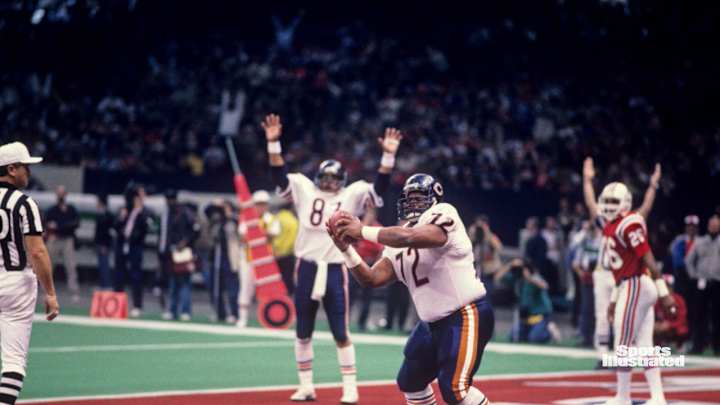Chicago Bears Haven't Been Super Enough for 35 Years

Tuesday, Jan 26 is the 35th anniversary of the only positive season's end many Bears fans remember.
Or should this read "some fans remember?"
As the years go by there are fewer fans old enough to remember Mike Ditka and Buddy Ryan hauled off the field on the shoulders of players in the Superdome, and the ticker tape parade along LaSalle Street to a rally in bitter cold at the Daley Plaza two days later.
It would be inaccurate to say the Bears have never been close to that level again. It would be entirely accurate to say they haven't been close enough to that level often enough.
They've only been in the playoffs 12 times since the day their defense dominated New England 46-10 in Super Bowl XX, and only five times did they field teams with realistic shots at winning it all.
Three of those came in the seasons right after the 1985 championship, so what does that say about the wasteland from 1989-2020?
They won division titles in other years, but during 1990, 2001, 2005 and 2018 it came as more of a pleasant surprise. Or if they won, they had too many factors working against them to make a serious run at the title unlikely.
35 years ago today, the Chicago Bears became Super Bowl Champions 🐻⬇️
— Barstool Chicago (@barstoolchicago) January 26, 2021
Must have been nice
pic.twitter.com/HUAVAzzG6w
Here were their next-best shots, seasons they really could have done it but through some twist of fate or one other better team they finished like the other 35 losers since a Lombardi Trophy arrived at Halas Hall for the first and only time.
Top of the hour #Bears have a new D.C. - Tom Thayer will give us a scouting report....
— Mully And Haugh (@mullyhaugh) January 26, 2021
And oh year 35 years ago today Tom helped #Bears WIN #SuperBowl XX we look back at that as well
Listen https://t.co/QNqhdQR7By
Tell that smart speaker to play six-seventy the SCORE! pic.twitter.com/k9O9j8GGRU
1. 2006
So many times in Super Bowls the losers get discarded with yesterday's newspaper. Newspapers, remember those? The lack of a great quarterback in 2006 made it easy for people to forget Rex Grossman and remember Peyton Manning winning the first of his two Lombardi Trophies. Yet, it was hardly an embarrassing one-sided loss as 29-17 might suggest. The Bears trailed only 22-17 and Grossman took a snap at his own 38 with 11:59 to go in the game. Grossman had just completed a 22-yard throw to Muhsin Muhammad, who caught a TD pass earlier in the game to put the Bears ahead 14-6. The drive had momentum. As the first-down play developed, Muhammad cut out to the sideline 16 yards downfield in a route designed to beat zone coverage and Grossman had never enjoyed much success on this play. He often lacked the right touch on his intermediate-range throws. The Bears tried this play several times throughout the year and usually it resulted in scary incompletions. They would have loved for that result this time. Colts cornerback Kelvin Hayden had perfect position to defend such a pass, got up in the air to get the pick and Muhammad was unable to reach out and pull him a few steps to the boundary. Hayden, who later played for the Bears, returned it 62 yards for the TD as other offensive players treated him like he was invisible. Game, set and match. The Bears' best shot at a Lombardi Trophy in the past 34 years had vanished.
What's often forgotten is the Bears still had plenty of time to overcome a 12-point deficit, though this wouldn't have been in character for an offense based largely on the running of Thomas Jones. But on the very next series Grossman got greedy and tried to force a deep ball 41 yards downfield to Bernard Berrian. Colts safety Bob Sanders made what is largely a forgotten interception because of Hayden's big play. Apparently no one ever taught the Bears offense about tackling after an interception—you'd think they had enough practice after playing with Grossman—but Hayden returned it 38 yards to the Bears 41 to get the Colts out of the hole and let them kill more clock as they dominated the rest of the game. Sanders had a huge role that day because he also hit Cedric Benson in the backfield and forced a fumble that Dwight Freeney recovered when the Bears had the ball at their own 48 and a 14-6 lead early in the second quarter.
🏈On January 26, 1986, the @ChicagoBears defeated the New England Patriots 46-10 in Super Bowl XX pic.twitter.com/tzVHCkiKdQ
— RetroNewsNow (@RetroNewsNow) January 26, 2021
2. 1988
It was a year made difficult by Ditka's heart attack, the retirement of Walter Payton after 1987 and another Jim McMahon injury. However, the Bears got hot at the right time. They hosted the NFC championship game in bitter cold and had already beaten their opponent, the San Francisco 49ers, in a defensive struggle. Still, it wasn't surprising when they were blown out 28-3. By the time they played this game they'd lost too many key defensive players to injuries, namely Richard Dent and several secondary players. Their lineup looked like a waiver wire list. They wound up with scrap-heap pickup Todd Krumm trying to cover Jerry Rice. No sense dwelling on how that went for them.
3. 2010
A return to the Super Bowl seemed possible with the quarterback they acquired one year earlier, Jay Cutler. They lost a season ender 10-3 at Green Bay when they had nothing to gain, and it let the Packers get into the playoffs. The popular narrative is Aaron Rodgers' only NFC championship game win came because he seized the opportunity and led the Packers to the Lombardi Trophy, beating the Bears as Jay Cutler suffered a first-half knee injury. The truth was, Rodgers wasn't good. The Packers defense got them to the Super Bowl because the Bears defense held Rodgers to a passer rating of 55.4 with two interceptions in the game. They needed a B.J. Raji interception return of 18 yards for a TD to provide the decisive points. Rodgers' rating was worse even than that of Cutler's backup, Caleb Hanie. So the 21-14 loss by the Bears was a completely frustrating day when they had a real opportunity to be in the Super Bowl again.
4. 1987
The NFL strike season started out fantastic for the Bears when they won what was billed as Super Bowl XXI 1/2 over the Giants, but by the playoffs they'd been through the usual McMahon injury problems. Then the Redskins shattered their dream on special teams with a 52-yard Darrell Green punt return for a decisive touchdown. It ended Walter Payton's and Gary Fencik's careers and proved particularly difficult because it was the second straight year the bulk of their Super Bowl-winning team had lost to Washington in the first round.
5. 1986
Mike Ditka took a gamble on Doug Flutie at quarterback instead of letting Mike Tomczak do it after McMahon's season-ending shoulder injury and lost. Flutie didn't fit in on a team that seemed to belong to McMahon and wasn't useful in a first-round playoff loss to Washington. But more disappointing was how Vince Tobin's defense didn't rise to the occasion and let Jay Schroeder own the day in a 27-13 Bears first-round playoff loss. This was basically the same team that dominated the Patriots the previous year, but without Ryan and McMahon. Particularly disheartening to Bears fans was how a team with dominant talent had managed to disintegrate largely by the end of 1988. They won a division in 1990 but were never real threats against the Giants in a lopsided playoff loss. After that, the bulk of their Super Bowl team started fade away.
TDIH: 35 years ago today the Chicago Bears won Super Bowl XX. @BobbleheadHall unveiled six Chicago Bears Bobbleheads to celebrate! #BearDown pic.twitter.com/zsYD7H3FZ6
— WGN Morning News (@WGNMorningNews) January 26, 2021
Twitter: BearDigest@BearsOnMaven
